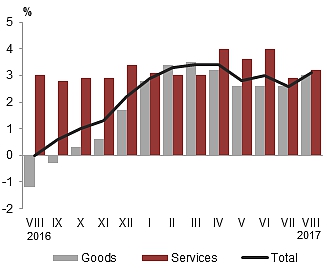Compared to August 2016, in August 2017 the greatest pressure on the price changes was put by the rise in prices of food and non-alcoholic beverages, goods and services related to housing, prices in miscellaneous goods and services group, prices of goods and services related to transport, prices in recreation and culture group, as well as prices of healthcare, the statistics office said.
The average level of food and non-alcoholic beverage prices increased by 6.8 %. Prices of goods and services related to housing grew by 2.1 %. Within the healthcare group, the average level of prices went up by 2.9 %, which was mainly influenced by the rise in prices of pharmaceutical products, dental services, as well as prices in medical specialist practice.
During the month, the average level of consumer prices dropped by 0.2 %
Compared to July 2017, in August 2017 the average level of consumer prices decreased by 0.2 %. Prices of goods fell by 0.6 %, while prices of services grew by 0.6 %.
In August, the greatest pressure on the consumer price changes was put by the decline in prices of food and non-alcoholic beverages, alcoholic beverages and tobacco products, prices in miscellaneous goods and services group, as well as by the growth in prices of clothing and footwear, and prices in recreation and culture group.
A commentary on the data from Swedbank said: "Inflation growth could slow towards the end of the year when prices leaped last year due to recovery in commodity prices. The average annual inflation could be around 3% this year and the next. The recent announcement of VAT rate reduction for vegetables, berries and fruits from 21% to 5% most probably will slightly slow price growth next year. But one must take into account that other factors affect fruit and vegetable prices as well. For instance, unfavorable weather conditions in Latvia and elsewhere in Europe have kept prices rather elevated. If this is the case next year as well, gain from the VAT reduction could be small. But inflation is just a part of the story. Both this year and the next wage growth will surpass that of prices. As a result households will be able to afford more goods and more services."






























